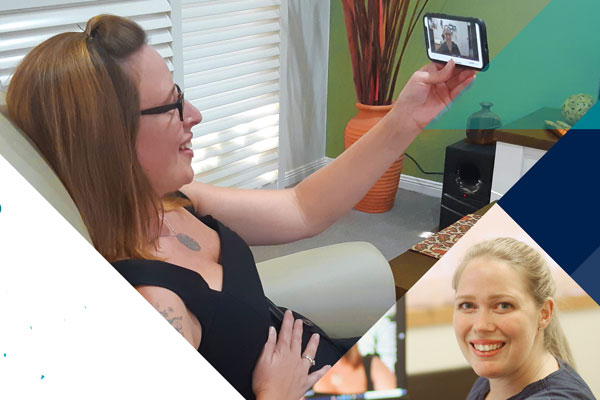From phone calls to virtual care: The Redcliffe Hospital antenatal telehealth story
 Redcliffe Hospital executive strongly believe in building a modern clinical workforce that are experts in virtual care. When the Covid-19 pandemic first hit, Redcliffe hospital antenatal clinic was suddenly directed to significantly change the way care was delivered.
Redcliffe Hospital executive strongly believe in building a modern clinical workforce that are experts in virtual care. When the Covid-19 pandemic first hit, Redcliffe hospital antenatal clinic was suddenly directed to significantly change the way care was delivered.
Many of the antenatal face-to-face appointments had to be outsourced to GPs or delivered over the phone and the very popular childbirth classes were unfortunately cancelled. In parallel women became increasingly aware that virtual care via videoconference (telehealth) was an option for obstetric appointments, which led to frequent phone calls asking for appointment mode changes.
During the initial phase of the COVID-19 emergency, several issues arose within our antenatal services. These included both staff and patients being inexperienced with telehealth technologies, the limitation of using a phone for antenatal telehealth appointments, the slow communication channels between our antenatal clinic and local GPs, and women’s distress at not being able to access childbirth classes or meet their caregivers. Reflections from women and staff on this initial experience all highlighted the need to embed virtual care in the antenatal setting in a way that was meaningful to women, moving beyond the telephone to incorporate video.
To support a sustainable telehealth service, the Redcliffe antenatal clinic chose to develop a criterion for offering women the option of using telehealth clinics. This included being less than 20 weeks pregnant and not a high-risk patient. Appointments have been limited to the initial booking interview with the midwife and birth classes. Telehealth appointments are always followed by a face-to-face appointment and any woman who expresses a concern about having a telehealth interview are immediately offered a face-to-face appointment. Further, ad hoc calls from women after 22 weeks pregnancy to change to a virtual appointment have to be triaged by the treating clinician to make sure there are no risks.
To improve consumer awareness and educate on the service, the staff created ‘Telehealth in Pregnancy’ posters and banners. 19 midwives and support officers received telehealth training. Finally, the support and guidance from the antenatal administration team has been essential in this process. One of the reasons for success in the adoption of telehealth is that administration staff were consulted in the codesign and encouraged to advise on the amount of telehealth appointments that were feasible to be offered through the clinic.
To date 74 new mothers have accessed the Redcliffe hospital virtual care antenatal appointments and survey responses to our virtual birth and parenting classes has been overwhelmingly positive. As you can imagine, being able to watch and participate in a class from the comfort of your own home is a great option for some busy families.
